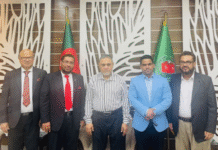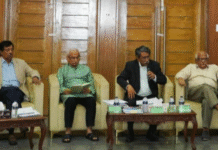-

Clockwise from top left: Khandkar Abdur Rashid, Shariful Haque Dalim, Noor Chowdhury, Moslehuddin Khan, Abdul Mazed, M Rashed Chowdhury.
The government does not have any official word on the whereabouts of the four absconding killers of Bangabandhu Sheikh Mujibur Rahman.
State Minister for Foreign Affairs Md Shahriar Alam told bdnews24.com they were making “every diplomatic effort to spot them and bring them back to face death penalty”.
Bangladesh is set to observe National Mourning Day on Saturday when in 1975 the independence architect along with most of his family members was brutally killed at his home by some disgruntled army officers.
Prime Minister Sheikh Hasina and her younger sister Sheikh Rehana survived the massacre because they were abroad.
Of the 12 convicts condemned to death in the murder case, five were hanged in 2010, one died abroad and six are absconding.
Of the six, M Rashed Chowdhury is living in the US and Noor Chowdhury in Canada.
A few months ago, Bangladesh Ambassador to Washington Mohammad Ziauddin wrote in an op-ed column that the US “affirmed an initial grant of asylum” to Rashed Chowdhury and his family.
The US ambassador in Dhaka had confirmed this, the state minister said on Friday.
“He can still be brought back. We’ll take both legal and diplomatic steps,” he said.
Alam said they were also trying to repatriate Noor Chowdhury from Canada, though its government made it clear that they would not deport anyone to a country where they could face death penalty.
But the junior minister said they were trying to persuade Canada “both diplomatically and politically” to deport him.
“We hope that at least one of them (from US and Canada) will be brought back during our tenure,” he said.
Col Khandkar Abdur Rashid (retd), Lt Col Shariful Haque Dalim (retd), Abdul Mazed and Moslehuddin are running away from the law.
Interpol has issued warrants to arrest them while reports of the quartet’s whereabouts keep surfacing from time to time.
Alam said they bring such informal message to the notice of the particular country where they are reportedly hiding.
“We don’t have any official information about them,” he said.
After the gruesome murder, 12 army officers involved had been awarded with jobs in Bangladesh’s diplomatic missions abroad in 1977 when Gen Ziaur Rahman, who founded the BNP, captured power through a military coup.
Bangladesh’s first military ruler later promulgated the Indemnity Ordinance to save the self-proclaimed killers of Bangabandhu.
The Indemnity Ordinance was abrogated on Nov 12, 1996 when the Awami League returned to power 21 years later.
“It’s a painful process to trace and bring the killers back. But it is our vow to bring back Bangabandhu killers,” the state minister said.
“Once it was unbelievable that Bangabandhu’s killers could be punished. But we did that. So we must not lose hope.”
Alam referred to the deportation of Mohiudin Ahmed by the US in 2007 after rejecting his asylum appeal.
“We thank the US government for deporting him. They did it even though we had no extradition treaty with them.
“Now we enjoy even better relations. New dimensions have been added to the relations with many formal mechanisms like security dialogue, partnership dialogue, and TICFA.
“So we have reasons to hope that the US will deport a killer so that we can conclude the legal procedure,” the junior foreign minister said.
The convicts hanged were Syed Faruque Rahman, Sultan Shahariar Rashid Khan, Bazlul Huda, Mohiuddin Ahmed and AKM Mohiuddin.
Another, Abdul Aziz Pasha, died in Zimbabwe.
Source: Bd news24









